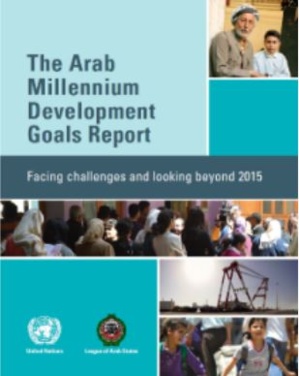While the Arab region has made progress towards many of the goals since 2010, the report shows progress has slowed since that time. At the heart of the slowdown today is the widespread impact of the crisis in Syria.
“The crisis in Syria is a crisis for development across the Arab region,” said Sima Bahous, Chair of the United Nations Development Group in the Arab States Region and Director of the United Nations Development Program (UNDP) Regional Bureau for Arab States. “The impact goes far beyond even the tragic and terrible widespread death and destruction in that country: it is also slowing the region’s progress on development.”
The Syria crisis has taken the lives of over 100,000 people, displaced over four million people within Syria, and forced over two million Syrians to flee the country as refugees. More than 1.2 million homes have been ruined, and one in five schools have been destroyed or damaged.
The report, a periodic update requested by the United Nations General Assembly (UNGA) on progress towards the Millennium Development Goals, shows that the crisis is also having a major impact on human development across the country. At least three million of Syria’s 22 million people have been pushed into poverty by the crisis, while the country’s extreme poverty rate has climbed at least back to 8 percent after having been virtually zeroed by 2007. School enrolment rates have plunged and access to health care has also significantly reduced.
Coordinated by ESCWA with analysis provided by UNDP and other UN agencies, the report comes in advance of a more detailed UNDP study to be released in October showing the impact of the Syrian crisis on development in Syria, Jordan and Lebanon.
“It is important to understand the depth and breadth of the development impact of the Syria crisis,” said Ms. Bahous. “When peace comes this will be the baseline from which we will all work to support recovery.”
The report also points out that the overall climate of instability and insecurity in the Arab region is dragging on progress more broadly across the region.
Economic activity has been slowed in Egypt, Tunisia and Yemen – countries which since 2011 have been pursuing complex political transitions. Over five million people across the Arab region have been pushed into unemployment since 2010.
In the case of Yemen this slowdown comes atop already high poverty rates and deep challenges across the entire spectrum of development.
The report shows that over 10 million people in the country, nearly half of the total population, may be food insecure. Instability also complicates an already dire degree of water scarcity. Yemen suffers from chronic shortages and may be the first Arab country to run out of water, possibly as early as 2015. As of June 2012, 12.7 million Yemenis lacked access to safe water or sanitation.
The report also shows that many Arab countries are off the path to reach many important MDGs. Overall the region lags behind on important targets, particularly those related to nutrition, food security, access to water and sanitation, and child and maternal mortality.
Previous UN reports have also shown that conflict has dragged on development in various countries in the region. The UNDP Arab Human Development Report 2009 documented broad development rollbacks due to conflict in Iraq and Somalia, and due to occupation in the occupied Palestinian territory.
The report comes amid continued efforts on the part of the international community to support an end to violence and a political resolution of the Syrian conflict which is now into its third year.
It also comes as humanitarian and development agencies continue their work in responding to the human impact of the crisis and preparing the ground for recovery. For its part, UNDP is scaling up a sub-regional development response which combines support for livelihoods and infrastructure repair in parts of Syria with efforts to support Jordan and Lebanon in their efforts to cope with their share of the over two million Syrian refugees who have fled to neighboring countries.
The report also comes as world leaders gather in New York to discuss, among other things, a new global development agenda which will come after the MDGs expire in 2015.
As heads of state shape the future of development one of the most active discussions surrounds options for reflecting the importance of peace and security in a new development framework.
“The experience of the Arab region makes the linkage clear,” said Ms. Bahous. “Where there is no peace, there is no development; where there is no development, there can be no peace.”
Download the report
“The crisis in Syria is a crisis for development across the Arab region,” said Sima Bahous, Chair of the United Nations Development Group in the Arab States Region and Director of the United Nations Development Program (UNDP) Regional Bureau for Arab States. “The impact goes far beyond even the tragic and terrible widespread death and destruction in that country: it is also slowing the region’s progress on development.”
The Syria crisis has taken the lives of over 100,000 people, displaced over four million people within Syria, and forced over two million Syrians to flee the country as refugees. More than 1.2 million homes have been ruined, and one in five schools have been destroyed or damaged.
The report, a periodic update requested by the United Nations General Assembly (UNGA) on progress towards the Millennium Development Goals, shows that the crisis is also having a major impact on human development across the country. At least three million of Syria’s 22 million people have been pushed into poverty by the crisis, while the country’s extreme poverty rate has climbed at least back to 8 percent after having been virtually zeroed by 2007. School enrolment rates have plunged and access to health care has also significantly reduced.
Coordinated by ESCWA with analysis provided by UNDP and other UN agencies, the report comes in advance of a more detailed UNDP study to be released in October showing the impact of the Syrian crisis on development in Syria, Jordan and Lebanon.
“It is important to understand the depth and breadth of the development impact of the Syria crisis,” said Ms. Bahous. “When peace comes this will be the baseline from which we will all work to support recovery.”
The report also points out that the overall climate of instability and insecurity in the Arab region is dragging on progress more broadly across the region.
Economic activity has been slowed in Egypt, Tunisia and Yemen – countries which since 2011 have been pursuing complex political transitions. Over five million people across the Arab region have been pushed into unemployment since 2010.
In the case of Yemen this slowdown comes atop already high poverty rates and deep challenges across the entire spectrum of development.
The report shows that over 10 million people in the country, nearly half of the total population, may be food insecure. Instability also complicates an already dire degree of water scarcity. Yemen suffers from chronic shortages and may be the first Arab country to run out of water, possibly as early as 2015. As of June 2012, 12.7 million Yemenis lacked access to safe water or sanitation.
The report also shows that many Arab countries are off the path to reach many important MDGs. Overall the region lags behind on important targets, particularly those related to nutrition, food security, access to water and sanitation, and child and maternal mortality.
Previous UN reports have also shown that conflict has dragged on development in various countries in the region. The UNDP Arab Human Development Report 2009 documented broad development rollbacks due to conflict in Iraq and Somalia, and due to occupation in the occupied Palestinian territory.
The report comes amid continued efforts on the part of the international community to support an end to violence and a political resolution of the Syrian conflict which is now into its third year.
It also comes as humanitarian and development agencies continue their work in responding to the human impact of the crisis and preparing the ground for recovery. For its part, UNDP is scaling up a sub-regional development response which combines support for livelihoods and infrastructure repair in parts of Syria with efforts to support Jordan and Lebanon in their efforts to cope with their share of the over two million Syrian refugees who have fled to neighboring countries.
The report also comes as world leaders gather in New York to discuss, among other things, a new global development agenda which will come after the MDGs expire in 2015.
As heads of state shape the future of development one of the most active discussions surrounds options for reflecting the importance of peace and security in a new development framework.
“The experience of the Arab region makes the linkage clear,” said Ms. Bahous. “Where there is no peace, there is no development; where there is no development, there can be no peace.”
Download the report











 Les dernières actus de Palestine
Les dernières actus de Palestine








